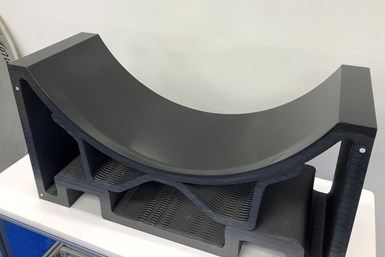Airtech Validates High-Temperature Polymer for Large-Format Tooling, Moldmaking
According to the company, the polymer is well suited for high-temperature applications such as hot forming tools, autoclave molds, oven molds and self-heated molds.
Airtech’s Advanced Materials Group says it has validated its Dahltram I-350CF high-temperature polymer for large-format toolmaking applications. The company says the polymer is well suited for high-temperature applications such as hot forming tools, autoclave molds, oven molds and self-heated molds. It is also vacuum tight, autoclave capable and can be machined to the tolerances and surface finish required.
The team performed autoclave cycle testing on cure molds to test the material’s durability. Using large-scale additive manufacturing, a layup mold was fabricated using Airtech’s Dahltram I-350CF for development testing. Thermal cycle testing was used to validate the performance of the high-temperature polymer for autoclave use.
All testing was completed at Airtech’s Huntington Beach location using the company’s in-house testing capabilities. During the course of 100 thermal cycles, dimensional stability and vacuum integrity were deemed critical. In addition to thermal cycle testing, a thermal survey was also performed on the mold to confirm that the printed tool could meet processing conditions for the aerospace industry.
The key metrics for this testing were dimensional stability and vacuum integrity. Overall, testing indicated the thermal conductivity and density of the printed material is comparable to that of a traditional composite laminate in all degrees of freedom, the company says.
Dahltram I-350CF is part of Airtech’s Dahltram series of polymer composite resins for use in large-scale 3D printing. The series is designed to address the need for a lower coefficient of thermal expansion (CTE) and offer a more robust service life when used at low or high temperatures, including use in an autoclave. The resin is reinforced with carbon fiber for added stiffness and stability, low thermal expansion and long-term performance.
The company says these thermoplastic composite resins are designed for use in any pellet-fed FDM printing system, making them suitable for multiple print platforms, providing production flexibility with end-use material validation.
Related Content
-
Video: Construction 3D Printing with Robotics, Geopolymer
Alquist 3D is aiming to revolutionize construction and infrastructure with large-format robotic 3D printing using a carbon-neutral material.
-
Evaluating the Printability and Mechanical Properties of LFAM Regrind
A study conducted by SABIC and Local Motors identified potential for the reuse of scrap reinforced polymer from large-format additive manufacturing. As this method increases in popularity, sustainable practices for recycling excess materials is a burgeoning concern.
-
Robot Vs. Gantry for Large-Format Additive Manufacturing (Includes Video)
Additive Engineering Solutions, specialist at 3D printing very large parts and tools on gantry machines, now also uses a robot for large-format AM. Here is how the robot compares.
















